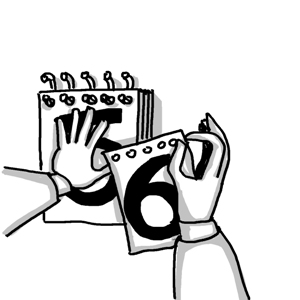Time to revise public holiday schedule

Illustration: Lu Ting/GT
After the three-day Mid-Autumn Festival holiday, many people are now looking forward to a week off for National Day. However, the holiday schedule is so confusing this year that some people would rather work than have the week-long break. This is because public holidays on the Chinese mainland are arranged in a different way to most countries in the world.
For example, in my native Hong Kong, employees get only one day off on October 1, the National Day. If a public holiday falls on a Sunday, then a day off from work or school will be granted on the following Monday.
My friends in Hong Kong are jealous that I am given "more public holidays" on the mainland. I quickly clarified that this is not really the case. One- or three-day public holidays on the mainland are expanded into a break of three or seven consecutive days off. So people have to work on a weekend to make up for the extended absence from work. Sometimes people have to work for a straight seven to nine days before or after they get a break.
We can get a clearer picture by comparing the number of public holidays in Hong Kong and the mainland this year. Hong Kong has a total of 17 days of public holidays, while the mainland has 29 days. However, only 11 of those 29 days are statutory holidays on the mainland; the remaining 18 days are shifted from weekends. That means people working on the mainland enjoy six fewer days of publicly mandated rest than their counterparts in Hong Kong.
Among the things I'm not used to about working on the mainland, the "reshuffling" of weekends to make extended public breaks is definitely one of them. Having a public holiday is our right. We should not be forced to work on weekends for having a holiday. I would rather have just one day of public holiday than work on a weekend to "earn" three consecutive days off.
The unusual holiday arrangement was introduced in 1999 in response to the Asian financial crisis to encourage domestic consumption and let the country benefit from a so-called "holiday economy." It may have been necessary for the government to introduce this kind of economic stimulus at the time, but China has changed considerably in the past 14 years.
Nowadays many people, especially the younger generation, opt to shop online. E-commerce sales broke a record high of 19.1 billion yuan ($3.12 billion) on November 11 last year, during an online shopping festival on taobao.com, three times that of the previous year.
With the popularity of Internet shopping, people can shop anytime, anywhere. It would be senseless for the government to assume that many people still wait until national holidays to spend money.
While longer breaks can help the tourist industry, when roughly 1.3 billion people vacation at the same time, flight tickets and hotels become more expensive, and the travel rush puts great pressure on the country's transportation system. During public holidays, trains, buses and scenic spots are so packed that vacationers feel even more stressed than they do at work. In fact, peak prices and cattle-like crowds have become so synonymous with national holidays that they actually deter many people from traveling. Allowing workers the flexibility to vacation when it suits them is more practical and more humane.
As times have moved on, the authorities should reform the public holiday policies to better serve the needs of the people and reflect the changes of Chinese society.